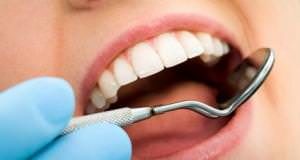Chewing Ability Linked To Reduced Dementia Risk
Can you bite into an apple? If so, you are more likely to maintain mental abilities, according to new research from Karolinska Institutet in Sweden. The population is aging, and the older we become the more likely it is that we risk deterioration of our cognitive functions, such as memory, decision-making and problem solving. Research indicates several possible contributors to these changes, with several studies demonstrating an association between not having teeth and loss of cognitive...
Message To Postmenopausal Women: ‘Increase Yearly Dental Checkups,’ Researcher Urges
Postmenopausal women have a new health message to hear. Two annual dental checkups aren't enough. Older women need more, according to research findings from the Case Western Reserve University School of Dental Medicine and the Cleveland Clinic.
Joint Failures Potentially Linked To Oral Bacteria
The culprit behind a failed hip or knee replacements might be found in the mouth. DNA testing of bacteria from the fluid that lubricates hip and knee joints had bacteria with the same DNA as the plaque from patients with gum disease and in need of a joint replacement.
Study Hints At Why Gums Suffer With Age
New research from Queen Mary, University of London in collaboration with research groups in the USA sheds light on why gum disease can become more common with old age. The study, published in Nature Immunology, reveals that the deterioration in gum health which often occurs with increasing age is associated with a drop in the level of a chemical called Del-1.
Newly Identified Oral Bacterium Linked To Heart Disease And Meningitis
A novel bacterium, thought to be a common inhabitant of the oral cavity, has the potential to cause serious disease if it enters the bloodstream, according to a study in the International Journal of Systematic and Evolutionary Microbiology. Its identification will allow scientists to work out how it causes disease and evaluate the risk that it poses.
Oral Bacteria Enables Breaking Bond On Blood Vessels To Allow Invaders...
A common oral bacteria, Fusobacterium nucleatum, acts like a key to open a door in human blood vessels and leads the way for it and other bacteria like Escherichia coli to invade the body through the blood and make people sick, according to dental researchers at Case Western Reserve University.
Dried Licorice Root Fights The Bacteria That Cause Tooth Decay And...
Scientists are reporting identification of two substances in licorice -- used extensively in Chinese traditional medicine -- that kill the major bacteria responsible for tooth decay and gum disease, the leading causes of tooth loss in children and adults. In a study in ACS' Journal of Natural Products, they say that these substances could have a role in treating and preventing tooth decay and gum disease.
Filling Without Drilling: Pain-Free Way of Tackling Dental Decay Reverses Acid...
Researchers at the University of Leeds have discovered a pain-free way of tackling dental decay that reverses the damage of acid attack and re-builds...
Diabetes: A Link Between Oral And Overall Health?
Diabetes affects 18.2 million people in the United States and is expected to double by the year 2010. Additionally, diabetics who do not have good control over their blood sugar levels are more susceptible to oral health problems than non-diabetics, according to a study that appears in the November/December 2004 issue of General Dentistry, the Academy of General Dentistry's (AGD) clinical, peer-reviewed journal.
Periodontal Disease Independently Predicts New Onset Diabetes
Periodontal disease may be an independent predictor of incident Type 2 diabetes, according to a study by researchers at Columbia University Mailman School of Public Health. While diabetes has long been believed to be a risk factor for periodontal infections, this is the first study exploring whether the reverse might also be true, that is, if periodontal infections can contribute to the development of diabetes.
Dentists Can Identify People With Undiagnosed Diabetes
In a study, Identification of unrecognized diabetes and pre-diabetes in a dental setting, published in the July 2011 issue of the Journal of...
How Cavity-Causing Microbes Invade Heart
Scientists have discovered the tool that bacteria normally found in our mouths use to invade heart tissue, causing a dangerous and sometimes lethal infection of the heart known as endocarditis. The work raises the possibility of creating a screening tool -- perhaps a swab of the cheek, or a spit test -- to gauge a dental patient's vulnerability to the condition.
















